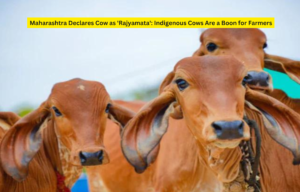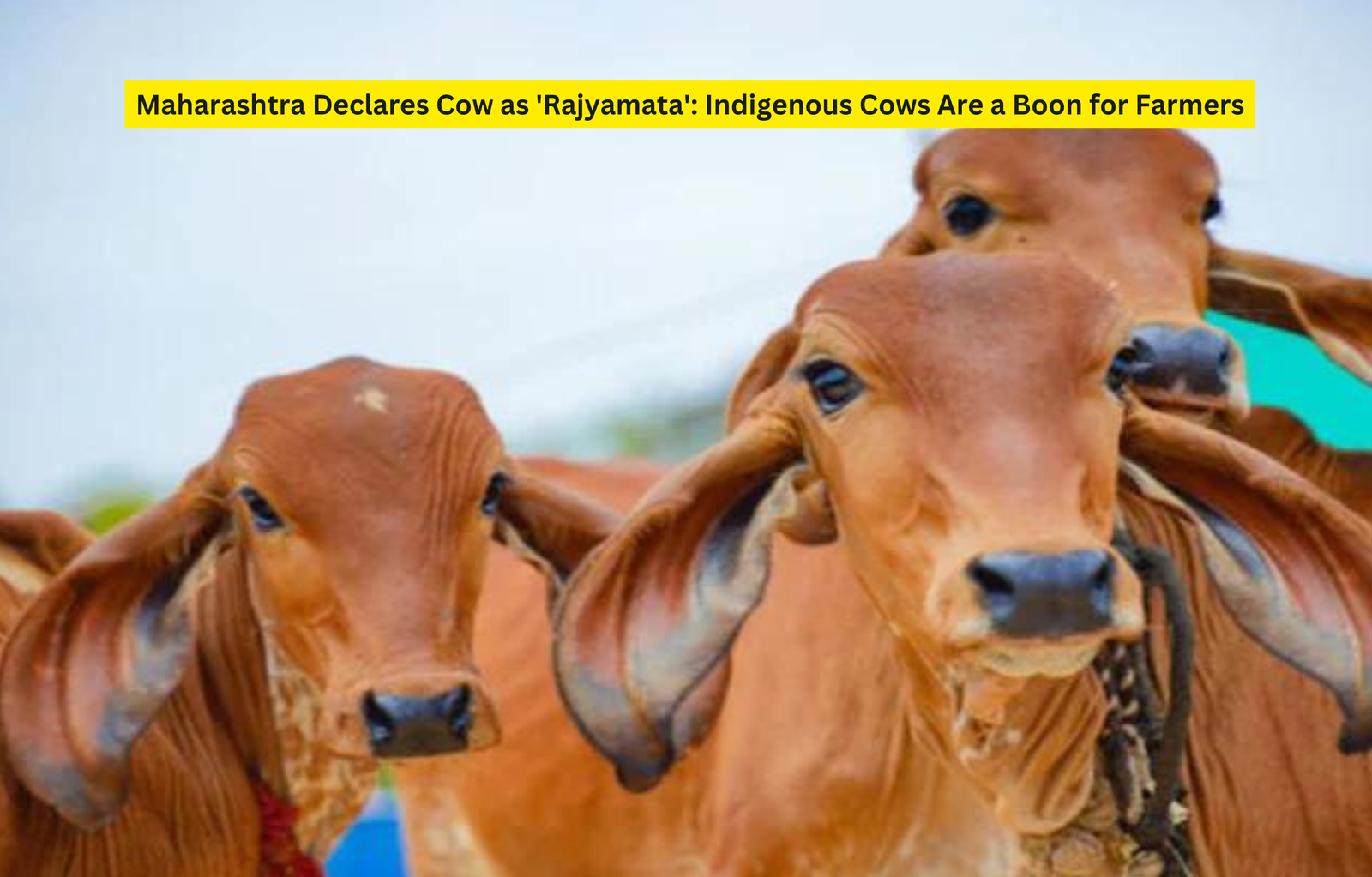Maharashtra Declares Cow as ‘Rajyamata’: Indigenous Cows Are a Boon for Farmers
In a significant and symbolic move, Maharashtra has bestowed the title of “Rajyamata” (Queen Mother) on the indigenous cow, recognizing its crucial role in agriculture and rural development. This decision highlights the state’s commitment to promoting and preserving indigenous cow breeds, which are seen as vital for the sustainability of farming in the region. Deputy Chief Minister of Maharashtra, Devendra Fadnavis, referred to indigenous cows as a boon for farmers, emphasizing their role in supporting the agricultural economy.

The Importance of Indigenous Cows in Maharashtra’s Agriculture
Maharashtra, like many other states in India, has a deep cultural and economic connection with cows, especially indigenous breeds. These cows, unlike their exotic counterparts, are better suited to the local climate and geographical conditions. Indigenous breeds such as the Gir, Sahiwal, and Red Sindhi are known for their resilience, ability to withstand harsh weather, and lower maintenance costs, making them ideal for farmers in rural India.
According to Deputy CM Devendra Fadnavis, indigenous cows are not just important for milk production but also play a vital role in organic farming. Their dung and urine are used to produce bio-fertilizers and pesticides, which are essential for sustainable agriculture. In recent years, as the demand for organic produce has grown, these cows have become even more valuable to farmers who are shifting away from chemical-based farming methods.
also read: BJP Conspiring to Topple AAP Govt Through ‘Back Door’ to Impose President’s Rule in Delhi
Why the Title ‘Rajyamata’ Holds Cultural Significance
The title of Rajyamata or “Queen Mother” carries profound cultural and religious significance in India. Cows have long been revered in Indian society, symbolizing nurturing, fertility, and abundance. By declaring the cow as Rajyamata, the Maharashtra government is not only acknowledging the economic contribution of indigenous cows but also aligning with traditional values that regard the cow as a sacred entity.
This move is also a nod to the ancient Vedic practices that highlight the cow’s pivotal role in sustaining human life through the provision of milk and dairy products, as well as its contributions to agriculture. The cow, often referred to as “Gau Mata” in Indian culture, is considered a maternal figure that nourishes and protects humanity.
read more:Overview of iPhone 15 Pro and iPhone 15 Pro Max
Economic Benefits of Indigenous Cows for Farmers
One of the primary reasons the Maharashtra government has elevated the status of indigenous cows is the clear economic advantage they offer to farmers. Unlike exotic breeds such as Holstein-Friesian or Jersey, which require intensive care and specific dietary needs, indigenous cows are hardy and can survive on local fodder, making them more cost-effective to maintain.
These cows are known for producing A2 milk, which is considered healthier and easier to digest compared to the A1 milk produced by some exotic breeds. A2 milk is in high demand in the health-conscious urban markets, offering farmers an additional source of income. The production of ghee (clarified butter) from A2 milk, in particular, has gained popularity, as it is associated with several health benefits, including improved digestion and immunity.
Moreover, the manure from these cows is highly valued for its use in organic farming. Organic farmers use cow dung as a natural fertilizer, enriching the soil with essential nutrients and boosting crop yields without the need for synthetic chemicals. This not only enhances the quality of the produce but also reduces the overall cost of farming inputs, providing farmers with better profit margins.
A Step Towards Sustainable Agriculture
The recognition of the indigenous cow as Rajyamata is part of a broader strategy by the Maharashtra government to promote sustainable agriculture. In recent years, there has been a growing realization that conventional farming practices, which rely heavily on chemical fertilizers and pesticides, are unsustainable in the long term. These methods degrade the soil, contaminate water sources, and harm biodiversity.
By focusing on the preservation and promotion of indigenous cow breeds, the government aims to encourage organic farming and reduce the dependence on imported fertilizers. Indigenous cows are central to this vision, as they provide farmers with the necessary resources for organic agriculture. Cow-based farming systems, which rely on cow dung and urine as organic inputs, help in maintaining soil fertility and reducing the environmental impact of farming activities.
Reviving Indigenous Breeds in Maharashtra
One of the challenges facing the agricultural sector in Maharashtra is the decline in indigenous cow populations. Over the years, many farmers have shifted to crossbreeding programs or have opted for exotic breeds that promise higher milk yields. However, this shift has come at a cost, as many indigenous breeds have become endangered.
To counter this, the Maharashtra government is taking proactive steps to revive and protect the state’s indigenous cow breeds. Various programs are being launched to encourage farmers to rear indigenous cows, including subsidies for purchasing and maintaining these animals. The government is also working to establish breeding centers for indigenous cows, ensuring that these valuable animals are preserved for future generations.
A Cultural and Economic Milestone
The declaration of the cow as Rajyamata in Maharashtra is a reflection of the state’s commitment to both cultural heritage and agricultural progress. While the cow has always been a symbol of prosperity in Indian society, this move by the state government also highlights the economic importance of indigenous cows to farmers. By promoting these breeds, the government is ensuring that farmers have access to more sustainable and cost-effective farming practices.
As the agricultural landscape continues to evolve, the role of the indigenous cow will only grow in importance. With initiatives like these, Maharashtra is setting a precedent for other states to follow, blending tradition with innovation to create a more sustainable future for its farmers.





